Democrat Katie Hobbs' defense of 2020 election puts her in spotlight in Arizona governor's race despite campaign missteps
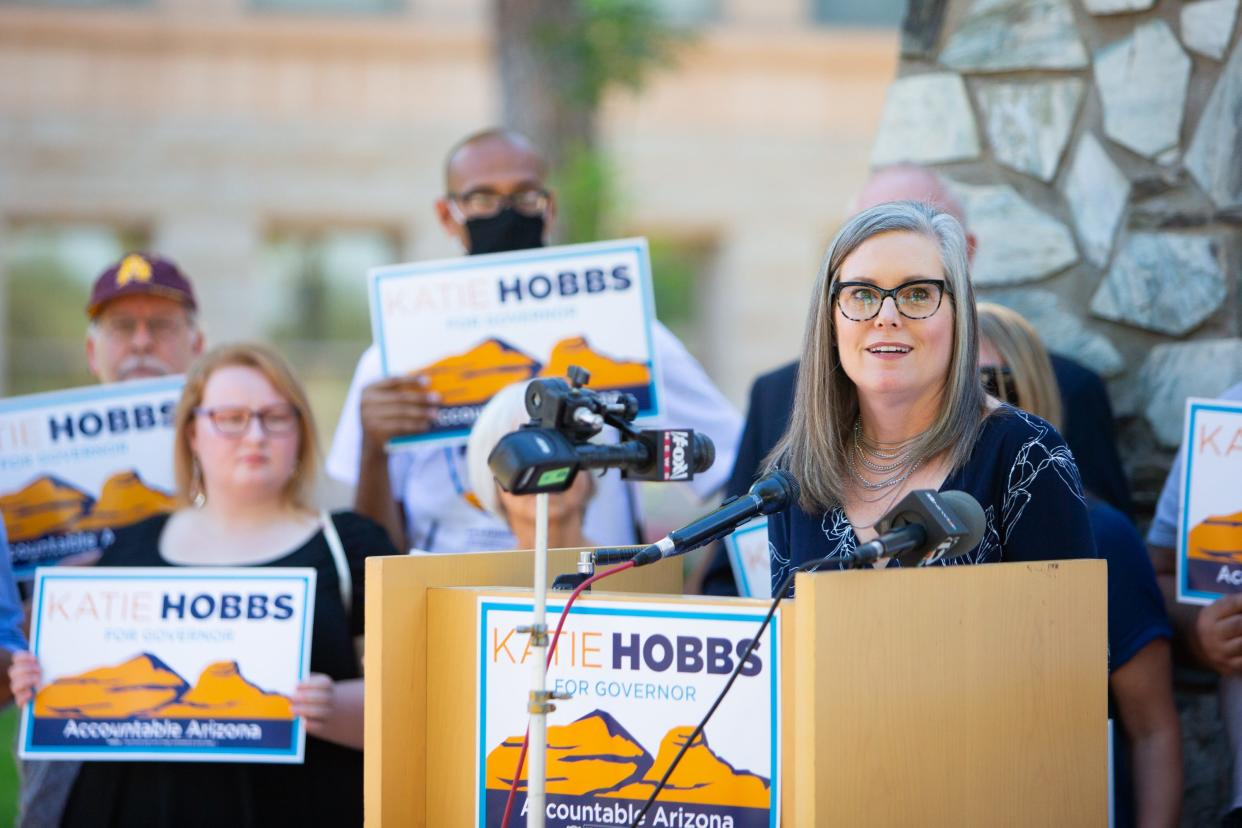
- Oops!Something went wrong.Please try again later.
- Oops!Something went wrong.Please try again later.
Democratic candidate for Arizona governor Katie Hobbs turned on her cellphone after a flight and saw the news: A draft opinion foreshadowed the U.S. Supreme Court would overturn a 49-year-old precedent guaranteeing women a right to abortion.
At a dinner shortly later, Hobbs and her staffers discussed an official statement. What Hobbs really felt, and what she ultimately posted on social media, were three simple words that rang out shocking and blunt:
“F--- the patriarchy," she wrote on Twitter, spelling out the profanity.
Hobbs, a liberal former lawmaker and current secretary of state, thought her voters needed to hear that from her. She'd spent her professional and political careers advocating for women and has pledged to continue that work if she's elected Arizona's next governor.
A leading voice in the national media defending the 2020 election and Democratic President Joe Biden's narrow win in a traditionally red state, Hobbs wants to make it easier to vote, give lower-income residents a leg up through various economic programs, and make state government more accountable.
Hobbs has portrayed herself as a stable alternative to her Republican opponent, the former television news anchor and Trump acolyte Kari Lake, who has said she would not have certified Biden's 2020 win in Arizona. The Nov. 8 election, for which ballots are mailed on Oct. 12, is a choice between "sanity and chaos," Hobbs often says.
In her first action, if elected, Hobbs said she would call the Legislature in for a special session to overturn a near-total ban on abortion that dates to 1864. At 52, Hobbs cannot recall a time when women didn’t have the option to choose an abortion, and as such, she's pledged to veto any efforts to restrict access if she's elected.
“My daughter is 20 and she's going to have less rights than I've had my whole life, and that's not OK," Hobbs said in an interview earlier this year. The Twitter post wasn’t anti-men, she explained, it was anti-laws that regulate women's choices and women's bodies.
“That wasn't me trying to placate anyone,” she said. "It was me, this was this moment of, 'I'm really angry about this.' And I needed to express that, and I think people needed to hear that from me because a lot of people shared that anger.”
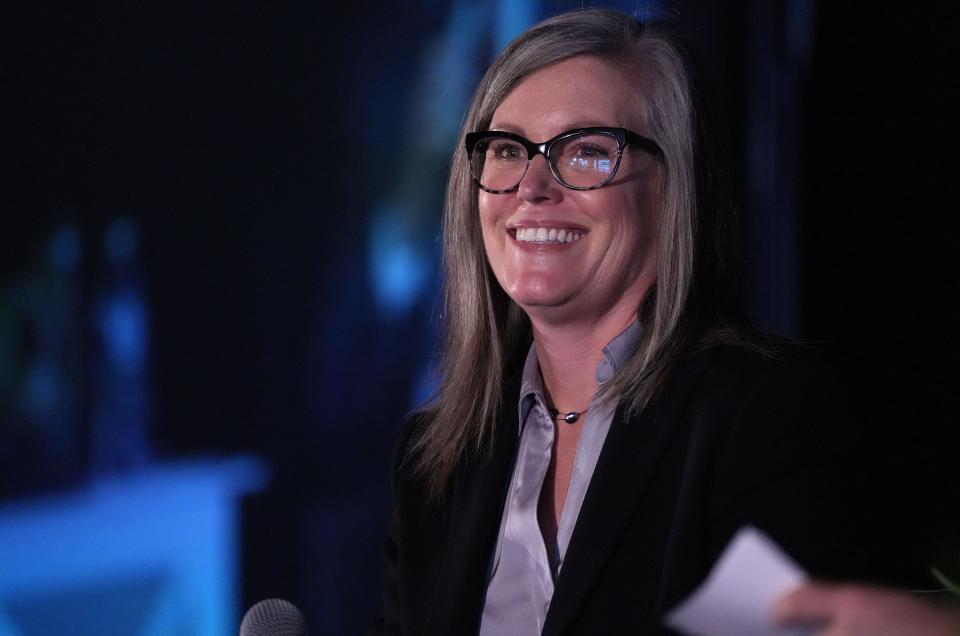
Advocating for the vulnerable
Hobbs was raised in a middle-class household in Tempe by Republican parents, though she said the family was not interested in politics. Her father's job selling plumbing supplies wasn't always stable and he spent periods out of work.
In fifth grade, about the time of the Reagan-era political attacks on government assistance, a teacher stood in front of the class railing against "government freeloaders." Hobbs didn't fully understand what it meant, though the encounter would become a pivotal moment in shaping Hobbs' interest in helping people at vulnerable times in their lives.
"I asked my mom about it when I got home and she got really upset," Hobbs said. "I realized then that my teacher was talking about people like our family, and people that rely on those supports that are there when they need them the most. People should never feel ashamed about that."
Hobbs began her professional career helping individuals in need but soon took an interest in fixing broader problems.
She earned a bachelor's and master's degree in social work from Northern Arizona University and Arizona State University, respectively. Out of college, Hobbs worked for four years in behavioral health and then handled contracts and worked as a lobbyist for the Sojourner Center, one of the nation's largest domestic violence shelters.
But Hobbs felt leaders weren't tackling the government systems that were leaving some people behind, and that "disillusionment" prompted her to leave the Democratic Party, instead voting as an independent between 1996 and 2004.
In 2004, she attended Emerge, a political boot camp for Democratic candidates that she later helped lead, and that ended her skepticism and convinced her to seek office. She won a seat in the state House of Representatives in 2010, and one term later, won a seat in the state Senate in 2012.
Hobbs was chosen by her peers to lead the party two years later, a powerful position that was tempered by the fact that Republicans maintained control of the chamber, making Democratic priorities an uphill battle.
Just two bills she sponsored became law, according to legislative records. One rewrote investigation procedures for complaints made to the Board of Dental Examiners. The other sought to protect child victims of domestic violence during encounters with police and child welfare workers.
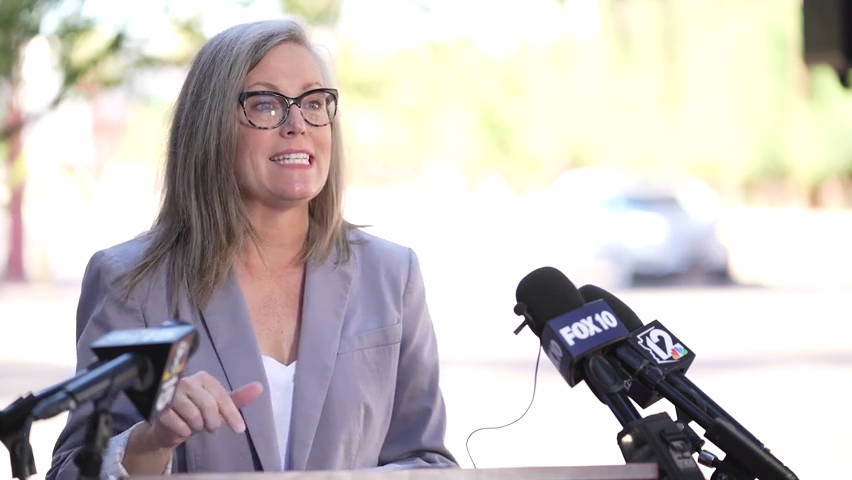
But as a leader in the chamber, Hobbs helped negotiate to advance Democratic goals by working across the aisle, including on legislation to ease the backlog of untested rape kits and securing funding to preserve a health care program that benefited almost 24,000 children in low-income families.
“She’s very down to earth, she can talk with anybody," said Steve Farley, a former lawmaker and Hobbs' assistant Democratic leader, who ran for the nomination for governor in 2018. "It was always about getting things done for the best interest of people who are just going to get hurt if you play politics."
Four years ago, she ran for secretary of state and won, making her the chief elections officer and pledging to set right an office plagued by mismanagement.
It was unforeseeable at the time, but her job overseeing and defending the state's election in 2020 would propel Hobbs into the national spotlight, offering a calm and steady defense against former President Donald Trump's false claims the election was stolen.
In June and July of 2021, the two months after Hobbs launched her bid for governor and as a widely criticized ballot review backed by Arizona Senate Republicans was ongoing, Hobbs was interviewed over 35 times by national news outlets, predominantly CNN and MSNBC, according to her official calendar. That's more than an interview every other day. The Republic obtained the calendar through a public records request.
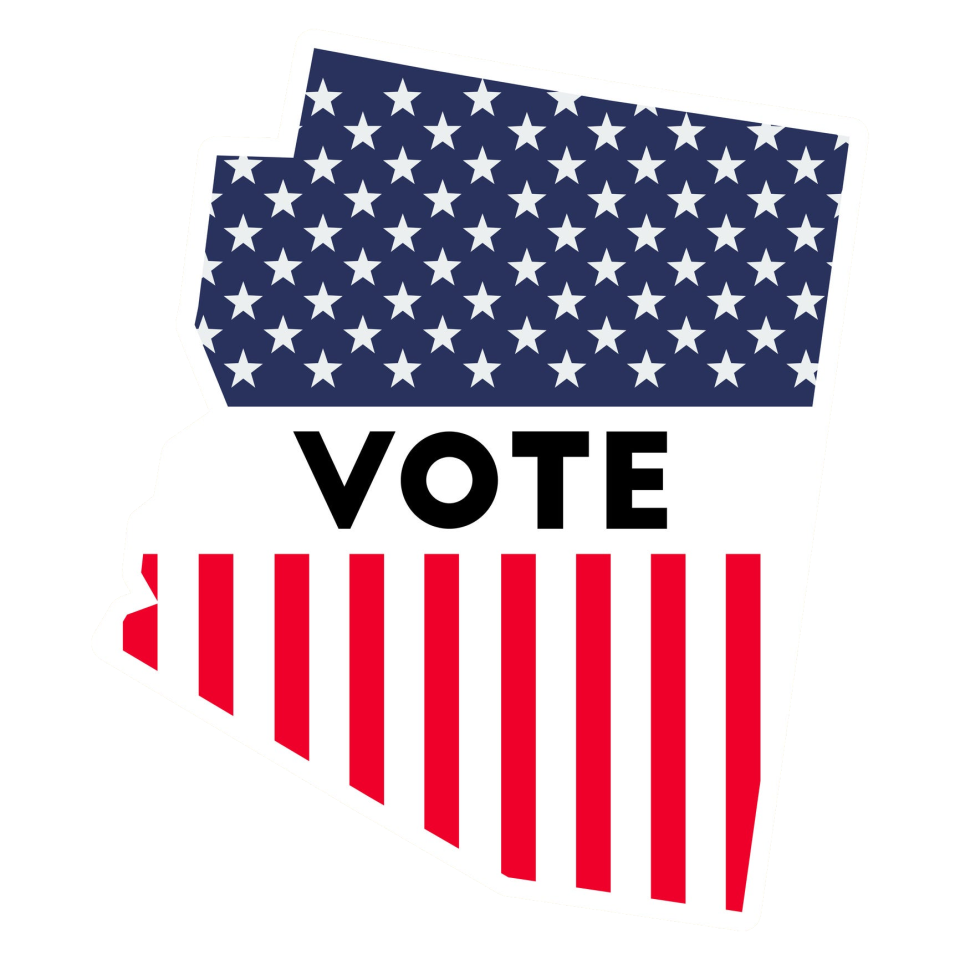
Election guide: November 2022
City races | School boards | State | Governor
| Ballot measures | Federal races | How to vote
But that defense of Arizona's election also made Hobbs the target of violent threats, including at least once when protesters showed up outside her home chanting, "We are watching you." The threats extended to Hobbs' family: her husband of 26 years, Patrick Goodman, a child therapist, and their children, a 23-year-old son now working in marketing and 20-year-old daughter balancing school and work. Her son's phone number was leaked and he was harassed, Hobbs said.
"We never imagined this could happen when I ran for secretary of state, but my family supported me in the job I had been elected to do," she said, "and these angry conspiracy theorists aren’t going to stop me from standing up and doing what’s right for Arizona and for our democracy.”
Questions about preparedness
Hobbs easily won the August primary, defeating her challenger by a 3-to-1 margin despite his attempts to portray her as an absent candidate who would be unresponsive to voters after she is elected. Her whereabouts on the campaign trail have continued as an issue, offering Lake grounds to attack.
Though Hobbs has a dozen years in public office under her belt, her campaign for the state's top elected office repeatedly has fumbled, raising questions about whether she is prepared to lead the state.
Republican-backed groups have attacked her after she responded to a yes or no question about Joe Biden's plan to lift Title 42, which turned away millions of migrants at the border, by saying the public health policy "wasn't working." The equivocation left the door open for political opponents to portray her as a flip-flopper.
Who else is running? These are the major candidates in the Arizona governor race
Her participation in the 2015 firing of a Black Democratic Senate aide, when Hobbs was the party's Senate leader, has lingered in the public eye for years. The aide, Talonya Adams, twice showed federal juries that she was discriminated against based on race and sex and paid significantly less than her white male peers when Hobbs was in Senate leadership.
A jury in November 2021 said Adams was fired in retaliation for raising concern about the disparity, awarding her $2.7 million. Last month, the state cut a check to Adams for the judgement, though it was approximately $300,000 because of caps on damages in federal law.
Adams' case raised broader questions about whether Hobbs trusted Black women by including testimony about Senate Democrats' first Black female leader, Leah Landrum Taylor, who told others she felt discriminated against when Hobbs and others ousted her from the leadership post. In court in 2019, Adams questioned Hobbs on the issue.
"Are there African-American women in your administration (the Secretary of State's Office)?" Adams asked, according to transcripts.
"Yes, there are," Hobbs said, though she faltered when asked to list their names. She said she'd been "put ... on the spot."
Landrum Taylor declined to discuss the issue with The Republic. After the second verdict in the Adams case, Hobbs' campaign first blamed Republicans who ran the Legislature at the time, though she had previously apologized to Adams. A month later, Hobbs issued a fresh apology for furthering "systemic racism," though she has maintained her reason for firing Adams was not rooted in discrimination.
Asked about the controversy, Hobbs said she hoped voters saw "someone who is willing to own up to their mistakes and learn from them. And everything I've done since that happened seven years ago is a reflection of the learning I've done."
State Rep. Richard Andrade, a Glendale Democrat who had supported Hobbs, said her response wasn't enough. “Instead of tackling the issues head-on, I felt like she was trying to dance around the issue," he said, withdrawing his endorsement of Hobbs.
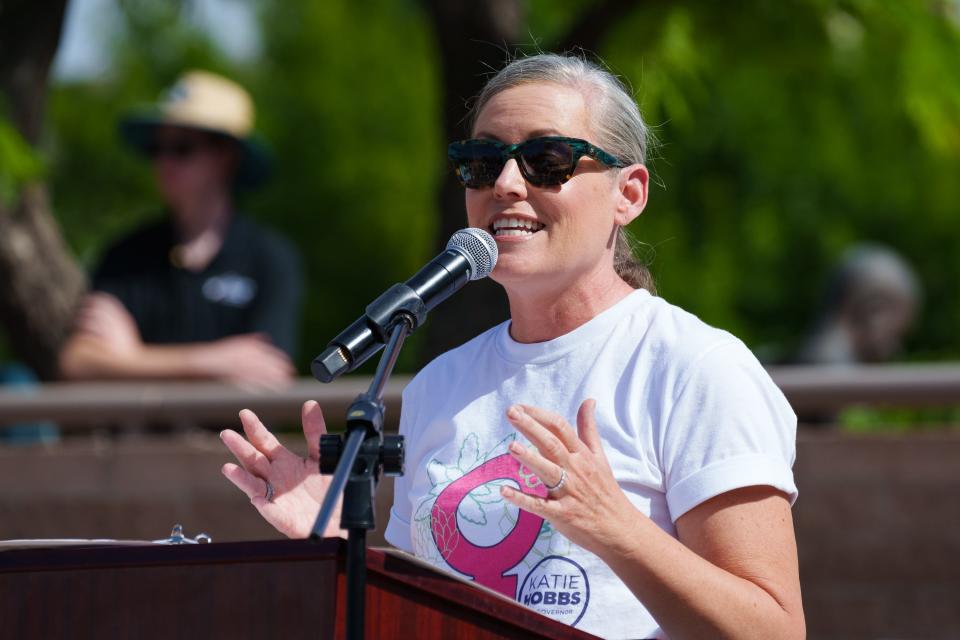
Hobbs refused to debate opponents
Hobbs chose not to debate her primary challenger, the former mayor of Nogales Marco López, in July, citing a scheduling conflict, though debate organizers offered to reschedule. More recently, facing an invitation to debate Lake, who spent her career on television before turning against the media, Hobbs also opted out. Her campaign said it was impossible to debate someone who espoused conspiracy theories.
Lake responded, calling Hobbs a coward and launching her own counteroffensive: A tour of smaller, question-and-answer events around the state. Even at events where they were never set to share the stage, Lake has tried to paint Hobbs as missing in action or afraid, an effort to raise questions about her leadership abilities.
Just a few of Hobbs' campaign events since August have been open to the press, offering a window into her campaign style, and one of those was a voter registration drive at Arizona State University in September. At the event, Hobbs brushed off a supporter who wanted to cheer Hobbs on to do the debate.
"It's bad form not to," the woman, Linda Martini, of Phoenix, told reporters. "Furthermore, she could destroy her opponents. There's no doubt about it. And the people want to see her on TV."
Martini said she believed Hobbs would lose supporters by not debating, though Hobbs' choice didn't change her own vote.
Hobbs has tried to dismiss the barbs coming from Lake as a distraction from the issues facing Arizonans.
"I have spent the last year-plus on the campaign trail talking to Arizonans about issues they’re concerned about, issues that our leaders have kicked the can down the road on for a long time — our water crisis, fixing public education, affordability is on voters minds,” Hobbs told NBC News’ Chuck Todd in a September interview.
"We need leaders who are going to address those issues. Bring people together to solve these problems. These aren’t Democrat or Republican problems. They are Arizona problems that need Arizona solutions. And I’m running to bring the leadership we need to tackle those issues.”
Reach reporter Stacey Barchenger at stacey.barchenger@arizonarepublic.com or 480-416-5669. Follow her on Twitter @sbarchenger.
Support local journalism. Subscribe to azcentral.com today.
This article originally appeared on Arizona Republic: Arizona Governor's Office 2022 Democratic candidate: Katie Hobbs

